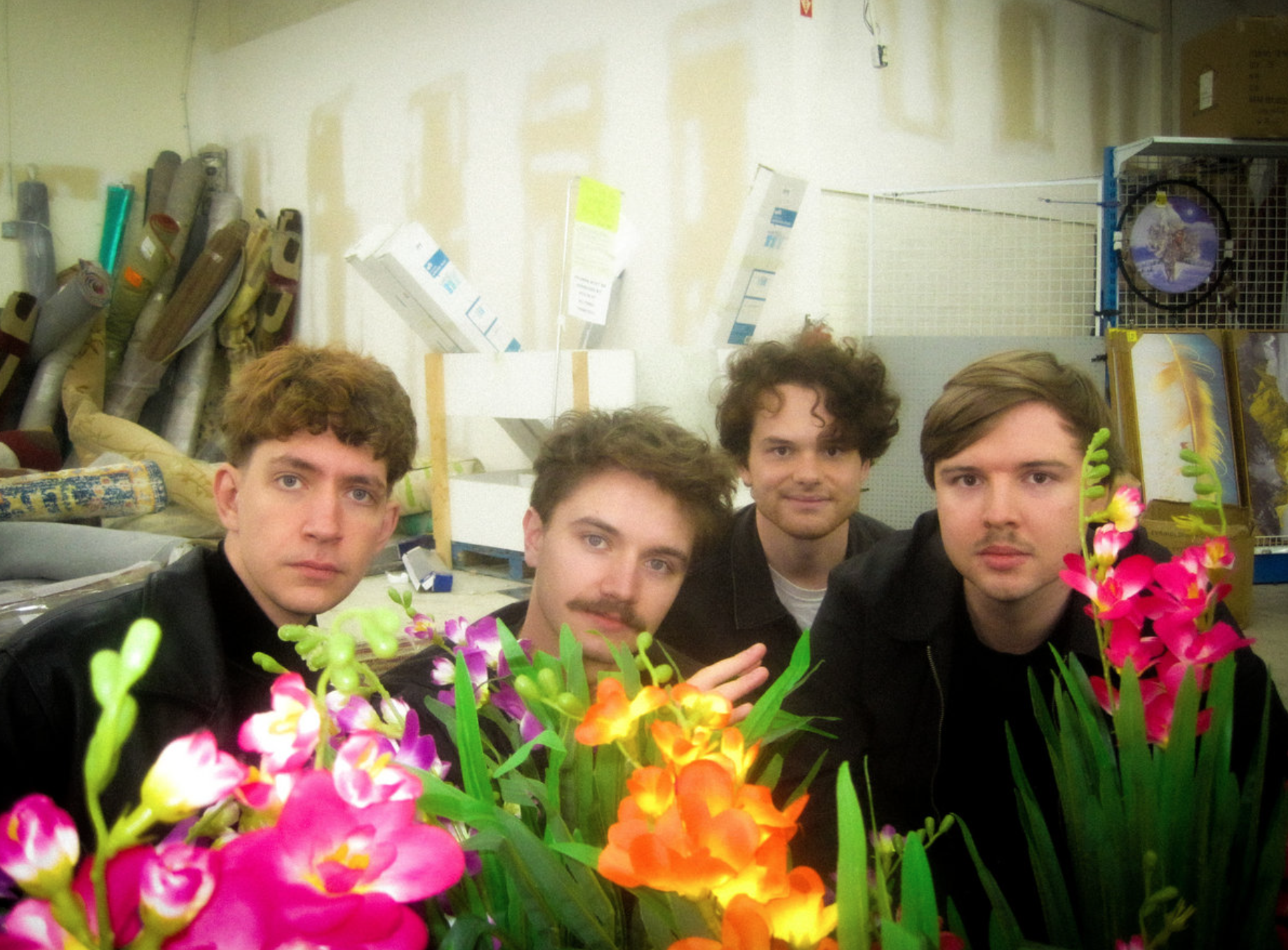Fencing’s Debut Album Captures the Existential Dread of Life Online
Fencing. Photo courtesy of the band.
Winnipeg’s Fencing are always evolving. What started as their high school project Urban Vacation, has given way to a fresh start and a more distinct artistic vision.
Their new record, Fencing Wikipedia (out September 12), grapples with existential dread while using a mix of samples that nod to the strange nostalgia of early internet aesthetics. Throughout the distortion drenched album, there’s a through line of humour that softens the edges. A reminder that for all their intensity, Fencing doesn’t take themselves too seriously.
REVERIE spoke with vocalist and guitarist Isaac Tate and bassist Sean Henderson to talk about Fencing’s debut studio album, their evolution as a band, and how to avoid accidentally corrupting your computer.
REVERIE: A few members of Fencing met from working together on Urban Vacation, would you like to start by talking a bit about how the band formed?
Isaac: Sean and I started a band called Urban Vacation when we were in high school. It was me playing guitar and then Sean on bass and our friend Noah drumming and singing. We made one album when we were like 18, 19 and then I I don't know, we tried doing it again, but it just kind of felt like its own insular thing.
Sean: And then the pandemic happened and we didn't play shows for a year-and-a-half and then it just felt like there was some distance. I felt like we needed something new, so then we decided that the new band would be called Fencing. Now it's kind of the same band, but different.
Isaac: Urban Vacation's was maybe a little more twee and cutesy in a way. And I don't know, I think we got angry. We got really angry and then I bought a distortion pedal, then Sean bought a fuzz pedal, and then we went a little off the rails.
REVERIE: What did you want to carry over from that project, and what did you want to leave behind?
Sean: I think we like we kept our approach at collaborating together. Our music is made from a place of friendship and passing ideas back and forth.
Isaac: I don't know if we really left anything behind other than reverb. I feel like in the 2010s that was reverb, and in the 2020s it’s distortion, but it's the same in spirit.
REVERIE: From the dial up sound effects on the track “Top Ten” to the album title Fencing Wikipedia, there seems to be an early internet influence on the album. What sparked these ideas?
Fencing Wikipedia.
Sean: The main themes of this album are driving in your car and going on the computer. Maybe more mentally than lyrically. Lyrically, it's very much a driving album, but it's also an album about being on your phone and being on your computer.
I feel like there's not a lot of like grace in like modern technology. Like the iPhone screen is not as exciting. I think in the “Dresses” video, we have Isaac smash an iPhone, which I love. But I think there is something special in the earlier internet and earlier digital video. There's something beautiful in the marriage of analog and digital that I really like the look, and the sound, and the feel of.
Isaac: I think we like when we were recording as Urban Vacation, we recorded most of that [project] on a 4-track, and then this album is a DAW album. All those samples were done with online YouTube-to-MP3 converters. Because I think we all like the sounds of things breaking and just like the gross compressed quality of YouTube-to-MP3 instead of sampling properly.
I remember making Top Ten and just recording the bass track of it and then just spending hours on YouTube. I think there's even Instagram reels running into the into the computer and getting sounds for that. It's more of a subconscious thing almost. And it's funny to think back to the processes. But it's just what feels right. It gave my computer a virus though, I couldn't use Safari for a while.
REVERIE: It feels like there's like a lot of existential dread permeating the album. I'd love to know like what draws you to those themes.
Isaac: That's just what life feels like a lot of the time. I don't know how to describe it other than it just feels like vibrating. Just everything for the past five years has just felt like the rainbow wheel… or the spinning wheel from the Temu pop-up ad on my phone.
I wrote out all the lyrics today and I thought about them for the first time in a while and I think it struck me, and I hope it comes across, that there's some humour in it too. A lot of the time I'm trying to be funny with a lot of the lyrics and I think I like the dissonance of when that doesn't land and how that feels. Like it's just kind of like a dry existential funny feeling.
REVERIE: I loved the track name “I Love the Red River Ex.” What other things about Manitoba do you love?
Sean: I love swimming in Lake Winnipeg before the algae blooms.
Isaac: I really like when you're driving west right before you get into Saskatchewan.
Sean: So, leaving.
Isaac: No, not leaving. But I just like the landscapes.
REVERIE: There’s a fair bit of cross-pollination in Fencing with other Winnipeg bands we love including Virgo Rising and Living Hour. Are there any other Winnipeg artists you think readers should be listening to?
Sean: My favourite band right now in Winnipeg is Our Friend Oscar. Isaac's wearing the shirt. I don't think they have any music out yet, but keep your eyes out for them.
Isaac: Jamboree and Boys Road.
Fencing’s first studio album Fencing Wikipedia is out September 12.
*This interview has been edited for length and clarity.



